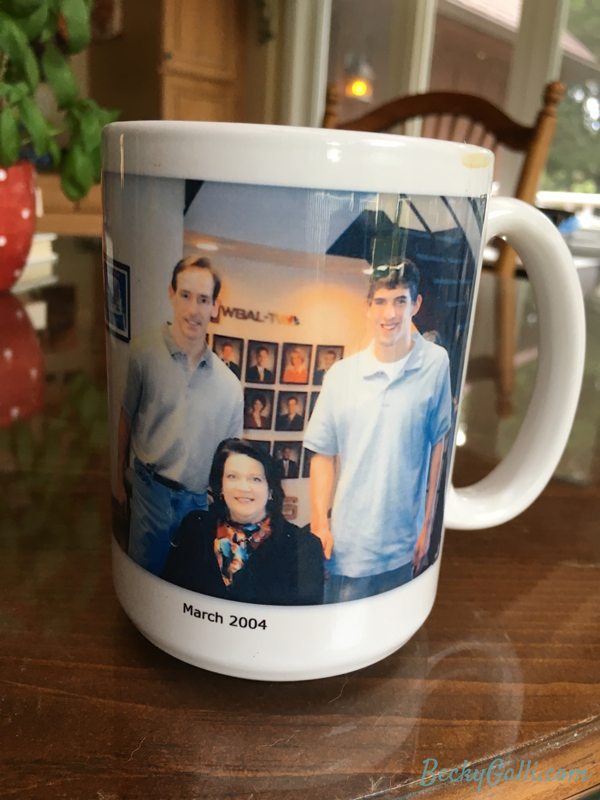
This week’s inspiration is from one whose quiet confidence struck me twelve years ago. In March 2004, I had the chance to spend some time with Michael Phelps in our work with Pathfinders For Autism. Here’s the column I wrote for a Baltimore Sun weekly.
Phelps shares water works with children with autism
By Rebecca Faye Smith Galli
His soft brown eyes brightened as he shook my hand and we settled into the cramped room. He tucked his lanky frame under the sound booth’s counter, his charming teenage-boy demeanor reminding me of one of my 16-year-old daughter’s dates.
With a 30-second script in one hand, the Towson native adjusted the microphone, cleared his throat and began reading his lines.
The boyish charm melted into a steady and clear voice, and the quiet confidence of a world champion filled the room.
“I’m Michael Phelps,” he began, and the words of the public service announcement became a declaration. “If you have a family member with autism, you’re faced with the challenges of finding the right treatments and support services,” he stated. “Pathfinders Autism Resource Center can help you find the right answers.”
Flanked by Oriole B.J. Surhoff and a WBAL cameraman, Phelps’ focus was steadfast. As honorary board member of Pathfinders for Autism, he’d agreed to become a spokesperson for the organization that is dedicated to finding resources for children with autism and their families.
He’d seen first-hand the joys that swimming can bring to a child with autism, and was eager to promote the campaign that began in April, National Autism Awareness month.
With no known cause or cure, autism is a disorder of the brain that affects 1 in 500 (now 1 in 68) children. Although considered a spectrum disorder – because of the wide range of abilities of affected children – autism almost always impacts a child’s communication and social interactions.
However, some children have sensory deficits as well, and crave pressure to help organize themselves if they are feeling distracted or overwhelmed – much the same way a newborn baby likes to be wrapped tightly in a blanket.
Swimming, many parents are discovering, provides a calm environment for some children with autism. The sheer weight of the water, or hydrostatic pressure, can have an amazing effect.
“Mason loves the water,” Polly Surhoff explains. Diagnosed with autism at the age of 2, Mason, like his mom, began swimming at an early age. A national champion herself, Polly still swims competitively and works out at the Meadowbrook Swim Club, Maryland’s powerhouse of champion swimming where she and Mason met Michael Phelps.
“It’s a great sport,” she says. “You can shut out the world and it’s just you and the water. There’s a kind of anonymity when you swim that allows you to forget who you are or what’s on your mind and just swim.” That’s a lot of passion for a sport that not once, but twice left Polly with no place on the Olympic teams. In 1980, she placed fourth on a three-man team. And in 1984, she placed third, but the team was reduced to two.
With true championship spirit, she still swims and directs her energies toward Pathfinders. Both she and husband B.J. are founding board members of this parent-sponsored nonprofit, whose mission is to help parents learn what other parents have discovered about managing life after autism. With her encouragement, Phelps joined as an honorary board member and helped launch April’s awareness campaign through radio and television announcements.
“So call us,” Michael concluded, giving out our toll-free number. “Pathfinders for Autism – we’re here to help.”
And the room again filled with that winning presence, inspiring a hopeful determination that energized us all.
A lot has happened in twelve years. The incident of autism is 1 in 68, 1 in 55 in Maryland. Our staff of eight serves over 18,000 people annually. Orioles Hall of Famer B.J. Surhoff is now president of Pathfinders. Polly and I are co-chairing our 5th biennial Pathfinders Fashion Show this fall. And Michael Phelps, well he’s Michael Phelps. His twenty-three gold medals not only reflect that hopeful determination I saw so many years ago, they also reveal the quality I admire most—resilience. He let his losses, both personal and professional, fuel a desire to rethink and then reclaim what his life could be.
Resilience, however, is not easy. It takes hard work and an unrelenting focus. Athletes know this as do parents of children with autism.
I haven’t been able to keep in touch with Michael except to cheer him on during each Olympic swim. But I’m grateful for a picture we snapped after taping that public service announcement. And even happier I have it on an inspiring photo mug.

B. J. Surhoff, Becky Galli, Michael Phelps
Phelps let life move through him, allowing his challenges to strengthen his resolve. I admire that spirit and try to apply it liberally to my own challenges in life from a wheelchair. How about you? Do you have a special photo or memento that reminds you of a strong resilient spirit? Tell me about it. I’d love to know.
My best–always,
Becky (Nana B)
P. S. Thanks again for all the encouragement about my upcoming book. If you are “FOMO-inspired,” or know someone who may be, click here for book updates, special offers, and availability.
The Phelps shares water works with children with autism article was originally published April 29, 2004 in North County News.
Sign Up Here, if you’d like to receive Thoughtful Thursdays via email.
Follow Me!